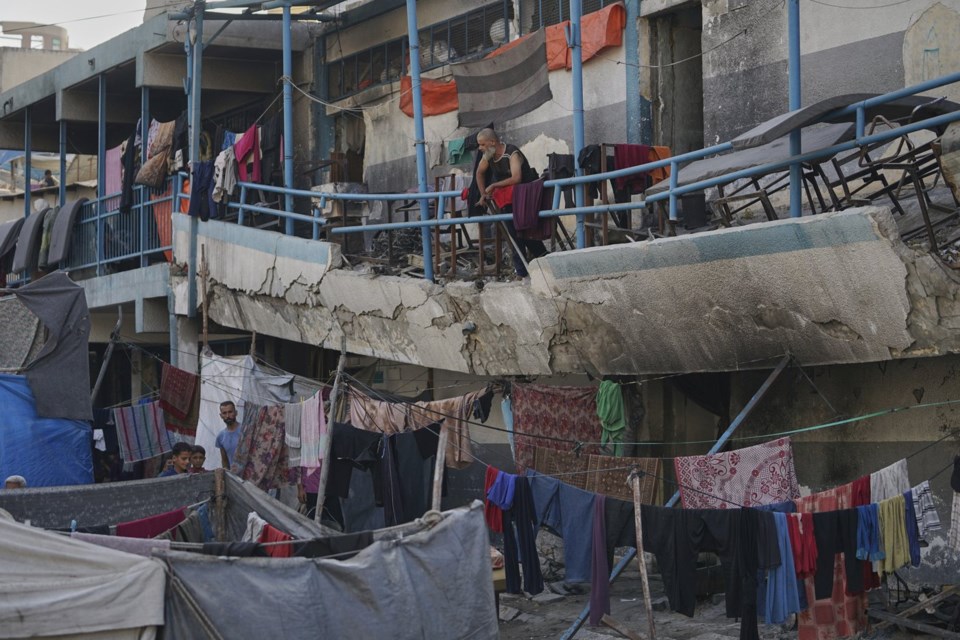GAZA CITY, Gaza Strip (AP) — Israeli and U.S. officials were to meet Wednesday in Washington to discuss post-war Gaza, even as Israel's military called the evacuation of Gaza City “inevitable” ahead of a new offensive and no sign of a ceasefire was in sight.
The meeting comes amid mounting outrage over this week's double Israeli strike on a southern Gaza hospital that killed journalists, emergency responders and others. The toll from the attack on Nasser Hospital rose to 22 after two more people died Wednesday, Gaza health officials said.
The Israeli military, which has said it will investigate, offered no immediate explanation for striking twice and no evidence for an assertion that six of the dead were militants.
As a growing chorus of international leaders urge Israel to reconsider its offensive and commit to talks, Pope Leo XIV called for Israel to halt the “collective punishment” and forced displacement of Palestinians in Gaza.
Israel prepares Gaza City for an evacuation
Aid groups warn that an expanded Israeli military offensive could worsen the humanitarian crisis in the besieged territory, where most of the over 2 million residents have been displaced, neighborhoods lie in ruins and a famine has been declared in Gaza City.
The Israeli military on Wednesday told residents of Gaza City to prepare to leave.
“The evacuation of Gaza City is inevitable,” spokesperson Avichay Adraee wrote in Arabic on X. He said Israeli forces have surveyed vast empty areas south of the city “to assist the evacuating residents as much as possible.” He said the displaced would receive space for tents, and infrastructure would be set up to distribute aid and water.
More than 80% of Gaza is designated as an Israeli military zone or subject to displacement orders, the U.N. humanitarian agency said in June.
Israel has pressed ahead with plans to mobilize tens of thousands of reservists. Prime Minister Benjamin Netanyahu has said the military will launch its offensive while simultaneously pursuing a ceasefire.
Hamas said last week that it accepted a ceasefire plan from Arab mediators.
Qatar, which has rarely assigned blame through more than a year of mediation, said Tuesday that Israel has yet to officially respond and “does not want to reach an agreement." Last week, an official from Qatar said the proposal under discussion was “almost identical” to an earlier draft that U.S. envoy Steve Witkoff put forth and Israel accepted.
The deal said to be under discussion would include a 60-day truce, the release of some of the 50 remaining hostages held by Hamas in return for hundreds of Palestinian prisoners, a surge of humanitarian aid into Gaza and a road map toward talks on a lasting ceasefire.
Many in Netanyahu’s coalition oppose such a phased deal. Meanwhile, protests have swelled in Israel as hostages' families and their supporters press for a ceasefire. The government argues that a widened offensive is the best way to bring them home and cripple Hamas’ capacity to launch future attacks.
Witkoff says Trump will chair a separate meeting
In Washington, U.S. Secretary of State Marco Rubio was set to meet Wednesday with Israeli Foreign Minister Gideon Saar.
Witkoff told Fox News on Tuesday that President Donald Trump would chair a separate meeting, which would feature “a very comprehensive plan.”
He did not offer details about that meeting, which did not appear on Trump’s public schedule for Wednesday.
Witkoff also said the official U.S. position was that hostages — Hamas’ main source of leverage — should no longer be part of negotiations. He told Fox News the talks should instead focus on issues such as Gaza’s future and how to define Hamas in that context.
Hospitals report strikes near aid sites
At least 39 Palestinians were killed and dozens wounded Wednesday across the Gaza Strip, the majority of whom died in Israeli strikes and gunfire, according to Gaza health officials.
In northern Gaza, officials from the area’s main hospital, Al-Shifa, as well as two field hospitals, told the AP that some 20 Palestinians were killed by Israeli gunfire and strikes, including at least five people seeking aid near the Zikim crossing in northwestern Gaza. U.N aid convoys that routinely enter the area through the crossing are repeatedly overwhelmed by thieves and desperate people seeking aid.
Mahmoud Balousha, 36, went to the crossing but returned Wednesday with only lentils.
“It’s the same every day. We go to get some food for our families, but looters climb onto the trucks to get the aid, and there is little left for us to take back home,” Balousha told the AP through text messages. “When chaos breaks out," Israeli troops "open fire toward the crowd, and people scatter everywhere.”
Israel's military did not immediately respond to questions about the strikes. Its offensive has killed nearly 63,000 Palestinians during the war, according to Gaza’s Health Ministry, which says around half were women and children. The agency does not distinguish between fighters and civilians in its count.
The ministry said Wednesday that 10 more people died of malnutrition-related causes over the past 24 hours, bringing the total number to 313 people during the war, including 119 children.
The ministry is part of the Hamas-run government and staffed by medical professionals. The U.N. and independent experts consider it the most reliable source on war casualties. Israel disputes its figures but has not provided its own.
Hamas-led militants abducted 251 people and killed around 1,200 people, mostly civilians, in the Oct. 7, 2023, attack that triggered the war. Most of the hostages have been released in ceasefires or other deals. Of the 50 remaining in Gaza, Israel believes around 20 are alive.
___
Metz reported from Ramallah, West Bank, and Abou Aljoud from Beirut, Lebanon. Associated Press writers Melanie Lidman in Tel Aviv, Israel, and Nicole Winfield in Rome contributed to this report.
___
Follow AP’s war coverage at https://apnews.com/hub/israel-hamas-war
Wafaa Shurafa, Sam Metz And Sally Abou Aljoud, The Associated Press




